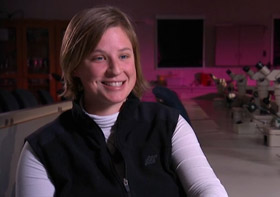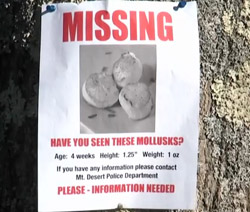Scallop Debacle: Alumna's Blog Post Lands Her on the Colbert Report
-
-
slice.mit.edu
Filed Under
Recommended

You never know how your 15 minutes of fame will transpire. Skylar Bayer SM '11, who earned her master's from the MIT-WHOI Joint Program in Biological Oceanography, can thank scallop gonads.
Bayer is currently working on her PhD at the University of Maine and studying scallop reproduction. Due to a mishap involving a fisherman, jars of gonad samples, and an unlocked blue Chevy four door, she lost all of her intended research samples.
The fisherman's wife took to social media and soon the scallop debacle made the Deep Sea News and the Bangor Daily News. Bayer writes for and edits the blog Strictlyfishwrap and later wrote two posts about it, "Found: My Lost 'Nads," and "Why My ’Nads Are So Important." From there, it was apparently just a short jaunt away from the Colbert Report staff. They picked up the story and blew it wide open. Watch the video "The Enemy Within—Dr. Skylar Bayer" then scroll down for the Q&A with Bayer about the experience.
The Slice of MIT Q&A with Skylar Bayer
Were you happy with the way the segment turned out? Yes! Very much so. I thought it was perfect, and it was a lot of fun. The producers on the Colbert Report were kind, low key, and just generally great people. I've gotten hundreds of fan emails from scientists saying how much they liked it and that it actually made them a) interested in my research and b) made me seem, as a scientist, like a human being with a sense of humor (and likeable).
Yes! Very much so. I thought it was perfect, and it was a lot of fun. The producers on the Colbert Report were kind, low key, and just generally great people. I've gotten hundreds of fan emails from scientists saying how much they liked it and that it actually made them a) interested in my research and b) made me seem, as a scientist, like a human being with a sense of humor (and likeable).So it went over very well with my research community (and my family, friends, and a lot of other people it turns out). I was told by people (and read this on Deep Sea News) that it's a lot of people's life goals to get on the Colbert Report. At least among young scientists.
How exactly did you prepare? I prepared by thinking about what I wanted to say and focus on in my interview. I also spoke with Ari Daniel Shapiro PhD '08, an MIT-WHOI alum, who does a lot of science stories for radio. He asked me a few hard questions and gave me some tips on what to say. He said that it's helpful to figure out your one-liner that you want to say about your research. You want to be as clear as possible.
One other important piece of information that I learned while talking to our university PR contact and Ari was that you can always say no to answering certain questions. You're allowed to say what you want, no one is going to force your hand as much as you think they are. At least, that was my experience.
How long did the filming take? Was it scripted or not? The filming for my interview and b-roll shots was about four hours. For the interview, they just ran the camera the whole time (no retakes). The two producers and their hired camera and sound crew went to Mount Desert Island the day before for interviews with Andy Mays, Michelle Mays, and Gail Garthwait. It wasn't scripted at all. Since I don't get to see the questions ahead of time, my responses are the first time I've heard the questions from the producers. They want to capture real responses from people, not scripted ones; I think it turns out better for the show.
Anything you'd like to add? I'm trying to recruit more writers for my blog, Strictlyfishwrap. I'd love to get more MIT students, actually. They're always doing great stuff.
Editor's note: The blog is a vehicle for (mostly) grad students to hone their writing and focuses on anything oceanographic: marine biology, ecology, and policy. Bayer is seeking a variety of content, including "anecdotal stories, commentaries on science life, field work (of all kinds, even terrestrial), cruises, fishermen meetings, teaching undergrads, being poor, job hunting, [and] balancing life."







